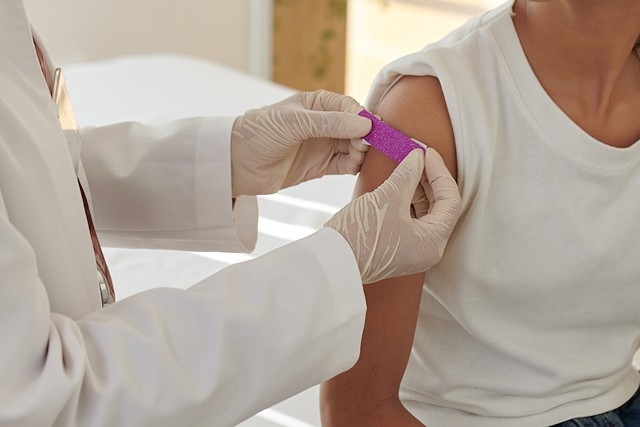Young people urged to get MMR vaccine amid rising cases
Date published: 01 July 2024

Photo: DragonImages - stock.adobe.com
Call for MMR vaccines amid rising cases
NHS Greater Manchester is urging over 200,000 16-25-year-olds who aren’t fully vaccinated to get their MMR (measles, mumps, and rubella) jabs amid rising cases.
This phase of the MMR vaccination campaign began last month and will see 201,000 young people across the city region receive letters and texts from the NHS. These notifications will inform them if they haven't had their MMR jab or have missed one of the two doses.
Any young person who is eligible, will then be able to book an appointment with their GP or visit one of the Greater Manchester pharmacies offering MMR vaccinations without an appointment.
This new vaccine push is part of a wider NHS MMR vaccine catch up campaign, targeting Greater Manchester, West Midlands and London – with these areas more at risk due to the number of people who are not up to date with their MMR vaccinations.
Earlier in the year, phase one saw over a million parents and carers of 6-11 years-olds in England, including Greater Manchester, that were not up to date with their MMR vaccinations sent emails, letters and texts inviting them to book a vaccine appointment for their children.
Then in April, 15 pharmacies from NHS Greater Manchester began taking part in a North West pilot offering the MMR vaccine for free to support the national call and recall of under-vaccinated children and to help increase MMR vaccines – joining 28 other pharmacies in the region to be the first in the country to take part in the trial.
This made it possible for the very first time, for anyone aged 5 or over who has missed their MMR vaccine, to walk into those taking part to get their free vaccination from one of the highly trained pharmacists – no appointment is needed, but there may be a wait for the pharmacist to become available and if the pharmacist is booked up, they may be invited to return at a planned appointment.
Measles is one of the world’s most infectious diseases with estimates showing that one infected adult or child can pass the disease onto around 15 other unvaccinated people. It spreads very easily among those who are unvaccinated, especially in nurseries, schools and universities.
Catching measles can lead to life changing issues for adults and children, such as blindness, deafness and swelling of the brain (encephalitis) – and those in certain groups, including babies, pregnant women, and people with weakened immunity, are at increased risk of these complications.
There is currently no medical treatment for measles, however, two doses of the MMR vaccine can give someone effective lifelong protection against becoming seriously unwell with the disease.
Dr Helen Wall, Clinical Director for Population Health at NHS Greater Manchester said: “With cases of measles rising in Greater Manchester and nationally, it’s more important than ever that young people ensure they have had both doses of the MMR vaccine.
“Measles doesn’t just affect children, it can affect people of all ages, and if you’re not fully vaccinated then you are more likely to get seriously ill and be hospitalised.
“The MMR vaccine is the most effective way to protect yourself and others – just two doses can give life-long protection against becoming seriously unwell. That’s why we are urging anyone aged 16-25 who hasn’t had both doses of the MMR vaccine to please find their nearest pharmacy offering the MMR vaccine or contact their GP surgery for an appointment.
“If you’re unsure if you have had one or both doses, you can check on the NHS app or contact your GP surgery. For anyone whose records are not up to date or it’s unclear either way, then we recommend getting the MMR vaccine anyway just to be safe.”
In the United Kingdom, over 20 million cases of measles have been prevented since vaccination against the disease began during the 1980s, according to data from UKHSA. Data also shows that over 4,500 lives - 81 lives per year-across the United Kingdom have been saved as a result.
Symptoms of measles appear 7-10 days after contact with the virus and include:
- Cold-like symptoms such as runny or blocked nose, sneezing and cough
- Red, sore, watery eyes
- High temperature (fever), which may reach around 40°C / 104°F
- A non-itchy, red-brown rash usually appears 3-5 days later (sometimes starts around the ears before spreading to rest of the body), spots may be raised and join to form blotchy patches – which may be harder to see on darker skin tones
- Small white spots may appear inside cheeks and the back of lips (for a few days)
More information about the symptoms can be found here: www.nhs.uk
If you or a family member develops any symptoms of measles contact your GP by phone. Please do not go to your GP, walk-in centre or any other healthcare setting without calling ahead, as measles is very infectious.
Do you have a story for us?
Let us know by emailing news@rochdaleonline.co.uk
All contact will be treated in confidence.
Most Viewed News Stories
- 1Two men charged after incident at Manchester Airport in July
- 2Two men issued Community Protection Warnings for begging in dangerous 40mph zone
- 3Braving the cold: Fundraisers endure 60-hour sleepout to combat homelessness
- 4Mum wins minister's backing for campaign to prevent chronic fatigue syndrome deaths - following...
- 5Campaigners fighting to save Rochdale’s Seven Sisters backed by Rochdale Council and local MP
To contact the Rochdale Online news desk, email news@rochdaleonline.co.uk or visit our news submission page.
To get the latest news on your desktop or mobile, follow Rochdale Online on Twitter and Facebook.


